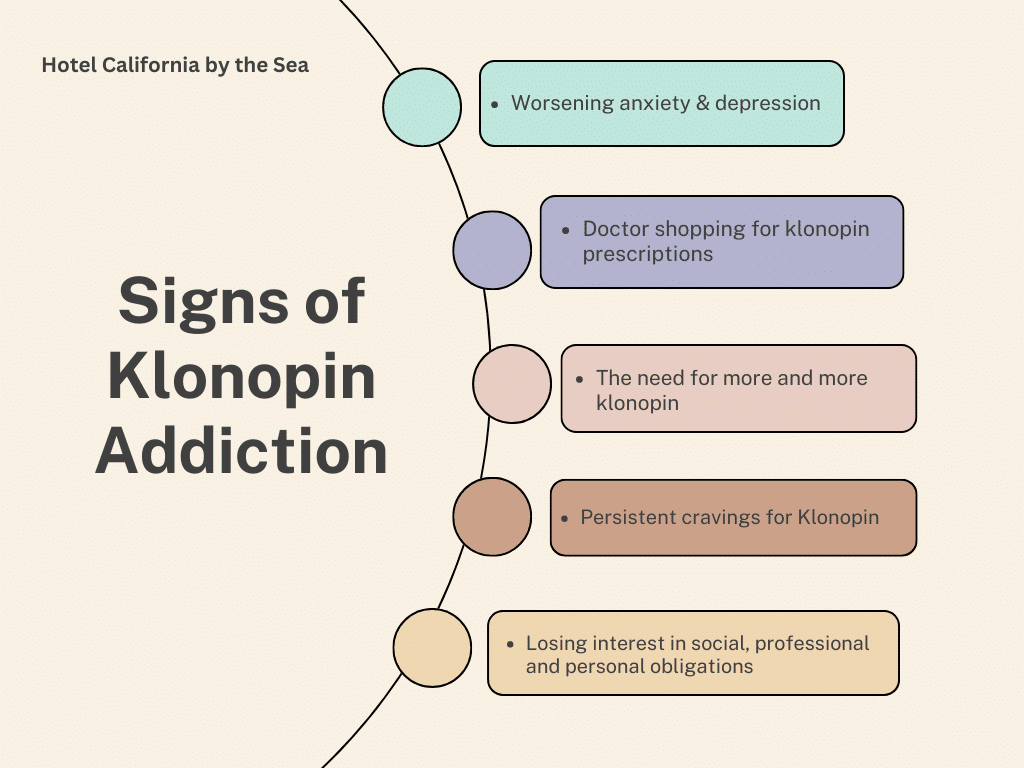Is a Klonopin Addiction dangerous?
Klonopin is the brand name of a benzodiazepine prescription medication clonazepam. It is often known to be a hypnotic sedative and muscle relaxant with amnesic prosperities. The FDA-approved medication is used for treating generalized anxiety disorder, panic disorder as well as certain types of seizure disorders. This drug is a long-acting benzos whose effects can last anywhere from 18 to 50 hours. This classification of benzos is a central nervous system depressant. It slows down brain activity, slows down respiratory breathing and can result in short euphoric highs followed by an intoxicating state of mind. It also makes this substance highly addictive resulting in Klonopin addiction.
In 2008, an estimated 60,000 users in rehab were being treated for an addiction to benzos such as Klonopin. In 2011, over 75,000 users were admitted to the emergency room due to problems with Klonopin usage. Prescription benzos was first introduced in 1975 to help people experiencing epileptic seizures. The FDA then approved it for treating various types of seizures including atomic seizures, myoclonic seizures, and absence seizures.

Benzos are among the most widely prescribed psychotropic medications worldwide. About 2-7% of the world’s population uses benzos like Klonopin for long-term use. This is despite warnings of abuse and addiction with long-term use. It is also a medication with some of the highest risks of dependency even when it is taken as prescribed by a medical physician.
Is Klonopin Addictive?
Klonopin produces a calming effect within 1-4 hours of the medications being taken with the symptoms lingering longer than most other benzos. Klonopin works by blocking specific receptors in the brain that result in reduced anxiety, reduced stress and intense relaxation. It binds to the GABA receptors in the brain, which is a chemical messenger that travels throughout your body. It helps to calm down the nervous system and works to promote muscle relaxation and alleviates symptoms of insomnia.
When consistently relying on Klonopin to produce those intense feelings of calm, the body is no longer able to naturally produce them without the help of the medication. The brain and body become dependent on the outside substance. Leading to both a physical and psychological breakdown resulting in cravings, dependence and addiction. The medication can remain in your system for up to 9 days.

Side Effects of Klonopin Addiction
While Klonopin can be very effective for those who are suffering from disorders such as anxiety and panic disorder, it can easily become habit-forming and turn into an addiction.
- Shortness of breath or weak and shallow breathing
- Memory impairment, mental fogginess and blackouts
- Slurred speech
- Extreme mood changes – increased agitation
- Confusion, paranoia and delirium
- Overall impaired cognition, judgment and delayed reaction
- Impaired physical motor control
- Drowsiness and dizziness
- Suicidal thoughts or actions
- Worsening anxiety and depression
- Insomnia or increased sleeping patterns
- Higher risk of misuse and addiction
- Higher risk of dependency and withdrawal
- Lack of motivation
- Increased cravings for Klonopin
Signs you may need Klonopin Addiction help
Even when used as prescribed by a trusted medical provider, prescription medications such as Klonopin can cause dependency and addiction. In fact, many Klonopin and benzos addictions begin innocently from taking the suggested amount by a medical physician. And many people do not realize or recognize that they may have an addiction.
- Persistent cravings for Klonopin
- Continued use of the drug despite repeated negative consequences
- Having a desire to quit or stop using the drug, but not being able to
- Losing interest in social, professional and personal obligations
- Legal or financial issues as a result of using Klonopin
- Doctor shopping and forging prescriptions for Klonopin
What are the Differences and Similarities between Klonopin and Xanax?
Both Xanax and Klonopin are prescription medications from the benzo drug category and both have the potential for misuse and addiction. They depress the central nervous system to treat common conditions such as sleep disorders, panic disorders and anxiety disorders. Extreme cases of anxiety disorders can cause emotional and physical distress that disrupts aspects of everyday life. Symptoms can include elevated heart rate, shortness of breath, digestive problems, headaches, sleep issues and fatigue. Xanax is more commonly used to treat anxiety, while Klonopin is most often used to treat panic and seizure conditions.
Xanax and Klonopin can begin working within hours of the first dose. One dose of Xanax will have lasting effects for a few hours. One dose of Klonopin can have a lasting duration of up to 2 or 3 times as long. Klonopin stays within the body for longer and produces lingering effects.
Common side effects of Klonopin include risk for depressed mood, suicidal thoughts, hallucinations, abnormal eye movements, difficulty speaking, insomnia and extreme mood and behavioral changes. Common side effects of Xanax include yellowing of the skin, difficulty speaking, poor coordination and confusion. Xanax can also cause changes in appetite and changes in weight. Both substances can also cause adverse reactions leading to rebound anxiety and depression as well as insomnia.
Check Your Insurance Coverage for FREE
Find out if your insurance covers addiction treatment in minutes. We accept most insurance!
Polysubstance Use: Klonopin and Opioids
Klonopin is often used in conjunction with other mind-altering substances to amplify its effects. This also creates a greater risk of addiction and overdose. Both Klonopin and opioids are central nervous system depressants. In 2021, an estimated 14% of overdose deaths involving opioids also involved benzos such as Klonopin. The combination of the two substances increases the risk of overdose because both can cause respiratory depression and extreme sedation.
Sometimes users get involved with both benzos and opioids through a prescription from two different doctors. For example, a primary care physician may prescribe Klonopin to help with panic disorder and anxiety. In contrast, a specialist physician may prescribe opioids for serious pain relief you may be experiencing. Both of these physicians treat separate conditions for the patient but have not created a dangerous combination of drugs. Both medications have a serious potential for misuse and can cause side effects leading to addiction and overdose.
Reach out to Hotel California by the Sea
We specialize in treating addiction and other co-occurring disorders, such as PTSD. Our Admissions specialists are available to walk you through the best options for treating your addiction.
Klonopin, like many types of benzos are potent and habit-forming substances that can become dangerous even when taken as prescribed. Once dependency and addiction set in, professional behavioral health programs are the best resources to turn to for help and treatment. Hotel California by the Sea provides specialized substance use disorder treatment from benzos such as Klonopin.
Through multiple levels of care including detox, residential and outpatient programs, clients can expect to receive rigorous and intensive treatment methods addressing all of their needs in addiction and recovery. Unique therapies such as CBT, EMDR therapy and family therapy help clients address the psychological aspect of their addiction. While detox and medication-assisted treatments help tackle the physical aspects of drug dependency. Together, both types of treatments create a well-rounded approach to recovery.
Hotel California by the Sea provides clients with the tools and resources they need to overcome their addiction. With evidenced-based treatments, a specialty in treating co-occurring mental health conditions and various opportunities for self-improvement, clients will have a greater chance at independent life outside of rehab.
References:
https://www.healthline.com/health/mental-health/clonazepam-vs-xanax
https://www.medicalnewstoday.com/articles/drugs-klonopin#_noHeaderPrefixedContent
https://www.addictioncenter.com/benzodiazepines/klonopin/
https://www.rehabspot.com/benzodiazepines/klonopin/
https://www.ncbi.nlm.nih.gov/pmc/articles/PMC4782857/
https://www.verywellhealth.com/using-benzodiazepine-to-treat-insomnia-3015197
https://www.medicalnewstoday.com/articles/323330
https://nida.nih.gov/research-topics/opioids/benzodiazepines-opioids
https://www.medicalnewstoday.com/articles/drugs-klonopin-interactions#klonopin-and-alcohol
